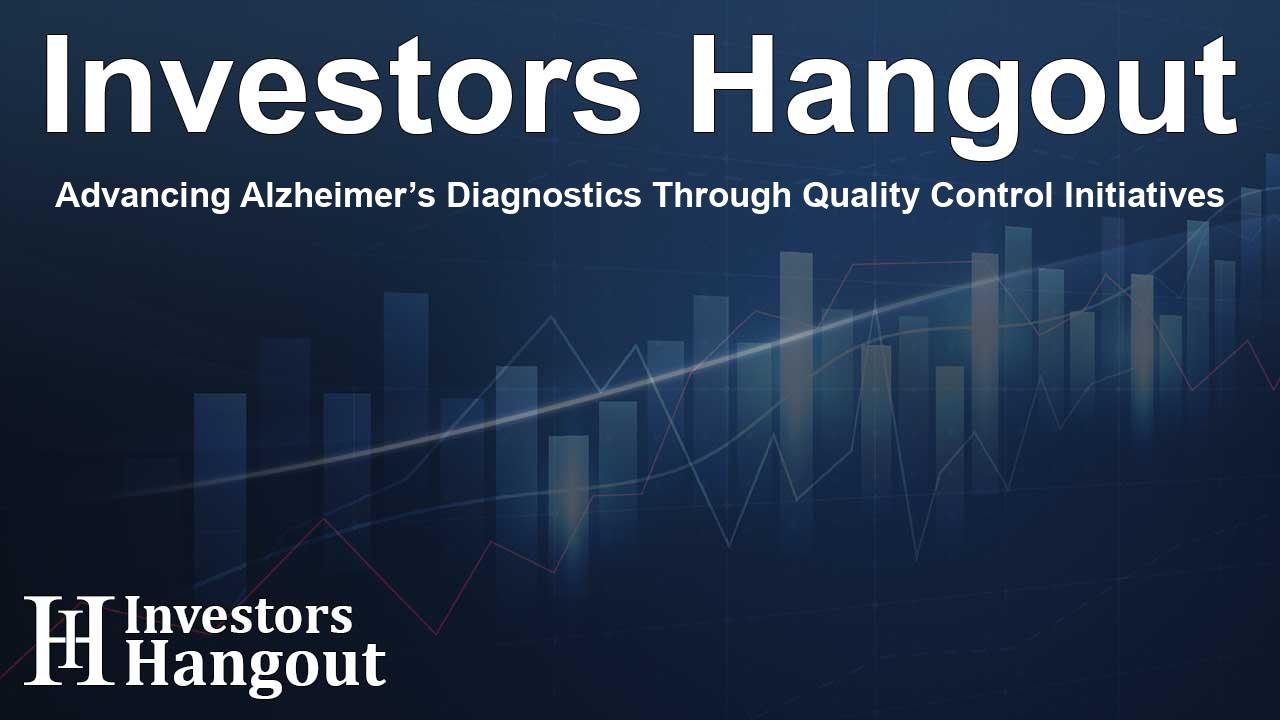Advancing Alzheimer’s Diagnostics Through Quality Control Initiatives

Alzheimer's Drug Discovery Foundation Invests in Quality Control Program
Recent efforts by the Alzheimer's Drug Discovery Foundation (ADDF) are taking significant steps to improve diagnostic capabilities for Alzheimer's disease. The foundation has announced an impressive investment of up to $2 million aimed at expanding the reach and effectiveness of its quality control program for blood and cerebrospinal fluid (CSF) biomarkers. This initiative, known as the University of Gothenburg Quality Control Program, is supported by the Diagnostics Accelerator (DxA) and the Global Biomarker Standardization Consortium (GBSC).
Enhancing Diagnostic Accuracy for Alzheimer's
Led by eminent experts in Alzheimer's research, Henrik Zetterberg and Kaj Blennow from the University of Gothenburg, this program focuses on standardizing testing across laboratories globally. By ensuring that high-quality and reproducible testing is conducted, this initiative promises to facilitate more accurate comparisons between various tests and help create more reliable diagnostic methods for patients.
Importance of Quality Control in Alzheimer's Research
As advancements in biomarker technology lead to new tests entering the market, the ADDF emphasizes that while regulatory clearance is vital, the sheer volume and variety of tests being used highlight an urgent need for enhanced quality control measures. Howard Fillit, MD, who co-founded the ADDF, affirms that developing dependable diagnostic tools is crucial for patients seeking early and accurate Alzheimer’s diagnoses.
Growth and Goals of the Quality Control Program
Established in 2009, this quality control program started with the mission to inventory and monitor the performance of CSF biomarker measures across clinical labs and research facilities. Initially focusing solely on CSF, the initiative has tremendously expanded to include blood biomarkers across multiple platforms, indicating its adaptability and evolution with the field. The newly allocated funds will facilitate its growth beyond the current 120 participating labs, emphasizing the program's commitment to ensuring high-quality testing across all laboratory settings.
Benefits of External Quality Control Programs
External quality control testing is essential for confirming the reliability of laboratory results. By comparing test outcomes with external standards or peer evaluations, such programs can identify errors, evaluate performance trends, maintain compliance with regulations, and enhance methodologies within laboratories.
The Role of Collaborative Support in Advancing Diagnostics
The ADDF’s commitment to developing more precise diagnostics is complemented by support from various sectors, including feedback from figures such as Niranjan Bose, Managing Director of Health and Life Sciences at Gates Ventures. Bose elaborated that improving access to reliable, high-quality diagnostic tools is pivotal for the millions affected by Alzheimer's every year. With emerging advancements in blood tests, the foundation's investment in expanding the Quality Control program reflects a broader vision for improving the diagnostic landscape.
About The Alzheimer's Drug Discovery Foundation
Founded in 1998 by Leonard A. and Ronald S. Lauder, the Alzheimer's Drug Discovery Foundation solely focuses on funding drug development initiatives for Alzheimer's disease. Through a venture philanthropy approach, ADDF supports both academic and biotech research, influencing major breakthroughs such as the first Alzheimer’s PET scan and blood test. With over $370 million awarded to 765 programs spanning various countries, the foundation continues to play a pivotal role in advancing the field of Alzheimer's research.
About The Diagnostics Accelerator (DxA)
The Diagnostics Accelerator (DxA), formed in 2018, represents a $100 million global initiative aimed at pioneering new biomarkers for the early detection of Alzheimer's. The collaboration includes notable supporters such as Bill Gates and Jeff Bezos, aiming to democratize access to reliable diagnostic tools, thus enhancing the clinical development of tailored treatment options.
Frequently Asked Questions
What is the goal of the ADDF's recent investment?
The ADDF's recent investment aims to enhance the quality control program for blood and CSF biomarkers, ensuring more consistent and accurate laboratory testing.
Who leads the University of Gothenburg Quality Control Program?
The program is led by Henrik Zetterberg and Kaj Blennow, who are recognized leaders in Alzheimer's research.
When was the original quality control program launched?
The quality control program was initially established in 2009 focused on monitoring CSF biomarker measurements across laboratories.
Why is external quality control testing important?
External quality control testing helps ensure lab accuracy, identifies errors, and maintains compliance with regulatory standards, contributing to higher quality diagnostics.
How does the ADDF support drug discovery for Alzheimer's?
The ADDF employs a venture philanthropy model, sponsoring research programs and contributing financially to projects that advance drug discovery efforts in Alzheimer's disease.
About The Author
Contact Dominic Sanders privately here. Or send an email with ATTN: Dominic Sanders as the subject to contact@investorshangout.com.
About Investors Hangout
Investors Hangout is a leading online stock forum for financial discussion and learning, offering a wide range of free tools and resources. It draws in traders of all levels, who exchange market knowledge, investigate trading tactics, and keep an eye on industry developments in real time. Featuring financial articles, stock message boards, quotes, charts, company profiles, and live news updates. Through cooperative learning and a wealth of informational resources, it helps users from novices creating their first portfolios to experts honing their techniques. Join Investors Hangout today: https://investorshangout.com/
The content of this article is based on factual, publicly available information and does not represent legal, financial, or investment advice. Investors Hangout does not offer financial advice, and the author is not a licensed financial advisor. Consult a qualified advisor before making any financial or investment decisions based on this article. This article should not be considered advice to purchase, sell, or hold any securities or other investments. If any of the material provided here is inaccurate, please contact us for corrections.
